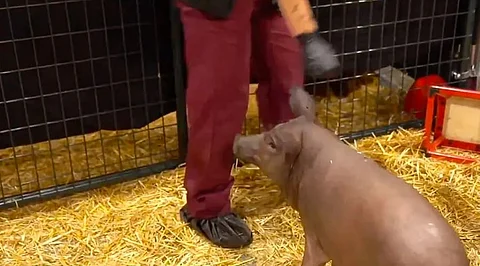
- Insights
- Cryptocurrencies
- Stocks
- White Papers
- Industry
- Geography
- Insights
- Cryptocurrencies
- Stocks
- White Papers
- Industry
- Geography


According to Reuters, Musk's medical tech company Neuralink is presently being probed by the US authorities for possibly breaking animal welfare rules. Animals are purportedly suffering and dying on a larger scale than required in Elon Musk's Neuralink labs due to Musk's urge to accelerate development and in many cases, the deaths do not even produce important research data.
You've probably heard about Neuralink labs before, especially in the last couple of years. Elon Musk and his firm promise to bring the human brain closer to technology than it has ever been before through the use of dedicated hardware. The business is presently developing the Neuralink N1 chip, which is a wireless implant that inserts into a subject's head and allows the chip to monitor the brain's functioning while also allowing the brain to use the device to enable previously unattainable use cases. Now it is alleged that Neuralink is killing animals in their labs.
Reuters was unable to identify the entire extent of the government inquiry or whether it covered the same alleged animal testing flaws revealed by workers in Reuters interviews. The USDA inspector general's office declined to comment. The US laws do not stipulate how many animals corporations can use for research, and they offer scientists a lot of freedom in deciding when and how to employ animals in trials. According to regulatory records, Neuralink has passed all USDA inspections of its facilities.
According to data seen by Reuters and people with direct knowledge of the business's animal-testing activities, the corporation has killed over 1,500 animals, including more than 280 lambs, pigs, and monkeys, as a result of trials since 2018. According to the sources, that figure is an approximate estimate because the firm does not keep accurate statistics on the number of animals tested and killed. Neuralink has also undertaken studies on rats and mice.
The overall number of animal deaths does not necessarily imply that Neuralink is breaking any laws or following conventional research procedures. Many corporations frequently employ animals in trials to better human health care, and they are under financial pressure to get items to market as soon as possible. When the studies are finished, the animals are usually slaughtered so that they may be studied post-mortem for scientific reasons.
However, present and former Neuralink staff claim that the number of animal fatalities is more than necessary due to Musk's demands for faster research. Reuters discovered four tests involving 86 pigs and two monkeys that were hampered in recent years by human mistakes through business discussions and papers dating back several years, as well as staff interviews. According to three current and former staff members, the errors decreased the trials' research value and caused the tests to be repeated, resulting in more animals being killed. The three persons blamed the errors on a lack of preparation by a testing crew operating in a high-pressure atmosphere.
One employee, seen by Reuters, sent an angry note to colleagues earlier this year about the need to change how the organization conducts animal surgery to prevent "hack jobs." According to the employee, the hurried timetable resulted in under-prepared and over-stressed personnel racing to meet deadlines and making last-minute alterations before surgery, putting the animals in danger.
Musk revealed last week that Neuralink might be ready to begin human testing within the next six months, assuming approval from the US Food and Drug Administration. However, it's best to take this pronouncement with a grain of salt. Even ignoring the current discoveries about Neuralink's animal experimentation, Musk has a track record of establishing unreasonably ambitious schedules and failing to deliver.
Musk stated in 2016 that Tesla planned to showcase a self-driving journey across the United States 2017. This did not occur. Musk said in 2018 that he will launch two cargo flights to Mars in 2022. This did not occur. Musk had previously stated that human testing for Neuralink will begin in 2020, followed by 2022. This, too, did not occur.
It will be very stunning if Neuralink begins human testing within the next six months. Even if it works, you should probably think twice before undergoing invasive brain surgery to allow the world's richest man to put a chip in your grey matter.
